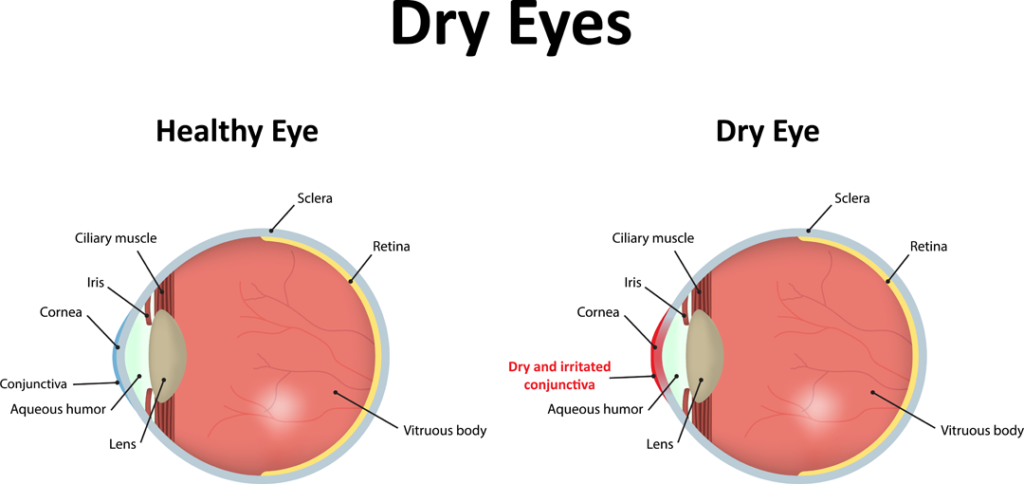20 Nov What is Dry Eye?
Millions of Americans are diagnosed with dry eye every day. In simple words, dry eye is a chronic condition that results from lack of tears, improper lubrication, or tears draining too quickly. Consequently, damage may occur to the exposed eye surface which causes eye discomfort.
Why are tears important?
Tears are essential in maintaining sharp vision and the health of your eyes. The human eye is lubricated by three kinds of tears produced by glands in the upper eyelid:
- Basal tears – are continuously formed to lubricate the eye and contain natural antibiotic substances that help to prevent growth of microorganisms. In the event that constant tear flow is reduced, our eyes become irritated and cause reflex tearing. These excess tears lack the oil needed to keep from evaporating and do not lubricate the eye.
- Reflex tears – are produced only in response to irritation, injury or pain. They help to rinse and flush out foreign objects out of the eye.
- Emotion tears- results from feeling of joy, sadness, stress and extreme emotion. Research has shown that they may contain more hormones and proteins than basal and reflex tears.
A balance is necessary between the types of tears to ensure that your eyes are comfortable and protected.

what-is-dry-eye
What are the common causes of dry eye?
- Aging. As we age, the tear glands produce fewer tears. Men and women of any age can be affected, however, after menopause and during pregnancy women are especially susceptible.
- Medications. A variety of medications are known to reduce tear secretion. These include beta-blockers, antihistamines, pain relievers, diuretics, oral contraceptives and antidepressants.
- Environment. Exposure to various environments can reduce eye lubrication – sunny, dry or windy conditions; heaters, fans or air conditioning; sand, dust or pollen, smoke, and high altitudes.
- Disease.Sjogren’s syndrome, rheumatoid arthritis, diabetes, lupus, Grave’s disease, blepharitis and many others are known to cause dry eye.
- Prolonged reading or computer use. Tears evaporate more rapidly during these long non-blinking activities, which can also give rise to faigue and eyestrain.
- Contact lenses. Wearing contact lenses often increases tear evaporation that can give rise to irritation, increased protein deposits, infection and discomfort.
What are some symptoms of dry eye?
- Excessive tearing (watery eyes)
- Mucous discharge
- Burning, itchy, eye pain or soreness
- Foreign body sensation, scratchy, gritty feeling
- Fluctuation of vision
- Light sensitivity
- Redness
- Contact lens discomfort
If you experience one or more of these symptoms, please bring these concerns and discuss with your doctor at your next appointment. As early treatment and management is essential to optimal outcome and healthier lifestyle.



